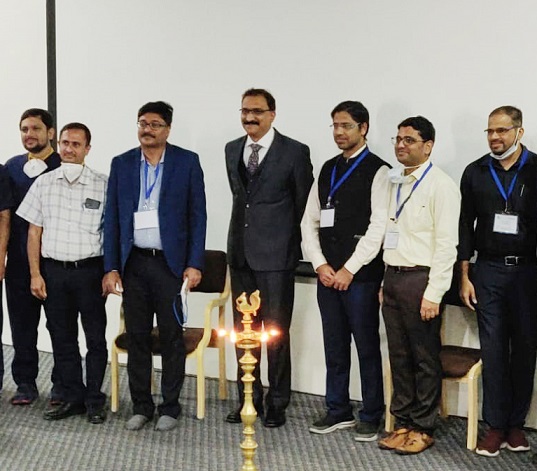Latest intubation techniques facilitate less complications & speedy recovery of patients: ISCCM

Mr Y Subramanyam (4th from left), CEO, Central Zone, Apollo Hospitals & Dr K Subba Reddy (3rd from left), Sr. Consultant & Head of Critical Care, Apollo Hospitals, along with other Critical Care specialists, at the inauguration of the ‘Difficult Airway Workshop’ hosted by Indian Society of Critical Care Medicine & Apollo Hospitals, at Apollo Health City, today.
Hyderabad: Indian Society of Critical Care Medicine (ISCCM), Hyderabad Chapter and Apollo Hospitals, Hyderabad; conducted a Difficult Airway Workshop at Apollo Health City Campus, Jubilee Hills, today. Mr. Y. Subramanyam, CEO, Central Zone, Apollo Hospitals, inaugurated the Workshop. Dr. K. Subba Reddy, Sr. Consultant and Head of Critical Care, Apollo Hospitals, Jubilee Hills and other Critical Care consultants shared their experiences in handling airway in sick patients during COVID pandemic. Over 100 Critical care and other specialists from across south India attended and learnt the latest techniques in effective endotracheal Intubation to enhance their skills in airway management.
Intubation is a lifesaving skill for all ICU physicians, where an ET (Endotracheal) tube is inserted into trachea before starting ventilator therapy for patients with low oxygen level and difficulty in breathing. The goal of the workshop was to train critical care doctors to perform intubation effectively and stabilize critical patients early, thereby enhancing the overall patient care.
The workshop dispensed knowledge on newer techniques of intubation like video laryngoscopy and fiberoptic bronchoscopy, among others. The advent of these techniques has immensely facilitated easy identification of the path to intubation by critical care specialists. They enhance the possibility to secure airway in the very first attempt without delay and helps to improve oxygen saturation quickly. These techniques significantly reduce complications associated with intubation and facilitate speedy recovery of patients. They are particularly useful in patients with facial fractures, head & neck injuries during accidents and in cancer patients involving oral cavity and needing ventilator therapy. These techniques also minimize direct exposure of patient’s oral secretions to doctor, which is critical during treatment of patients with lung infections like COVID & TB infections.
